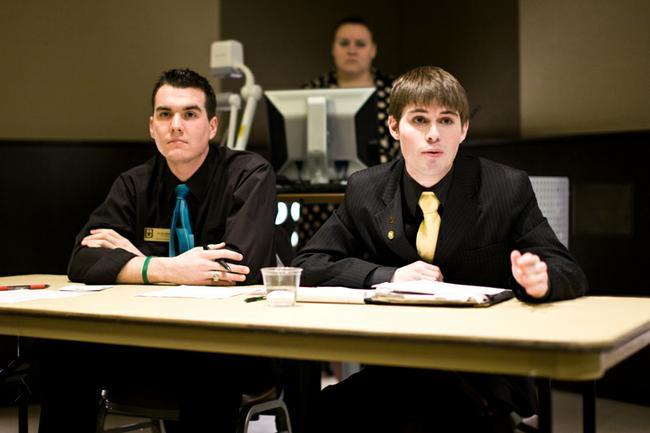Residence Halls Association presidential candidates gathered Sunday afternoon to hold a debate for the election, which is to be held at the end of RHA Week on Thursday.
Each slate was present — Chris Rucker and Caleb Krenning, Zack Folk and Lindsay Weber, and Gage Caszatt and Lydia Harvengt. To start off the debate, each slate discussed the importance of increasing the visibility of RHA.
“We’d really like to increase the visibility and excitement of being in RHA,” Folk said. “Promoting leadership in the residence halls is a central part.”
Rucker said only 1 percent of involvement in RHA is from residents themselves, and each slate discussed ways to get more people involved.
“We need to offer more services and make sure that people are getting their money’s worth from their residence halls,” Rucker said.
During the debate, the slates also discussed issues such as overcapacity in the dining halls and classrooms, sustainability in residential halls, increasing attendance in hall governments and their plans on how to use the $8,000 to $9,000 RHA will be receiving next year from the reallocation of the social fee.
During the sustainability discussion, each slate talked about ways to promote recycling on campus.
“We’d like to have a recycling bin in every room, which will cost about $21,000,” Rucker said.
The recycling bins would be funded by a grant RHA is trying to secure through a Student Fee Capital Improvement Committee request next year.
Caszatt and Harvengt talked about placing recycling bins in the common areas, making them more accessible to residents.
“If there’s not just a trash can in the common area but a recycling bin as well, this will make it easier for students to recycle, and it can become a daily practice,” Caszatt said.
Folk and Weber said educating residents about sustainability practices such as Mizzou Dashboard Competition, which promotes the reduction of energy use in the residential halls, is important.
“We need to talk to them and tell them about Dashboard and why it’s important,” Weber said.
Each slate said they also have plans for the reallocated social fee being received next year.
“This money is going to go back into the legislative branch so it can get back to the residents through sponsorship,” Rucker said.
The Rucker-Krenning slate also discussed ways to add more sponsorship opportunities and expand the available services to residents to host more events.
“We want to have anything from DJ equipment to popcorn machines, really anything the students want so that they can plan bigger and better events,” Krenning said.
Harvenget said the Caszatt-Harvengt slate wants to find more effective ways of communication with residents so they are more aware of events going on.
“A sign on the wall can only do so much, so having more people around and talking face to face and making those connections is what’s going to be most effective,” Harvenget said. “We want to be able to streamline the process of these large events.”
The slates also said finding more ways to promote leadership and have a larger group of residents in the hall governments is important.
“We want to have monthly forums in the residence halls and go talk to them about what’s working for them and what’s not,” Krenning said. “Having a how-to guide on the events going on will help our visibility as well.”
Each member of the slates also said they are ready to continue their work and put in a great deal of effort toward RHA despite the outcome of the election.
“We are excited people, and we are hardworking people,” Folk said. “We have enough diversity of opinion to make RHA the best it can be.”








